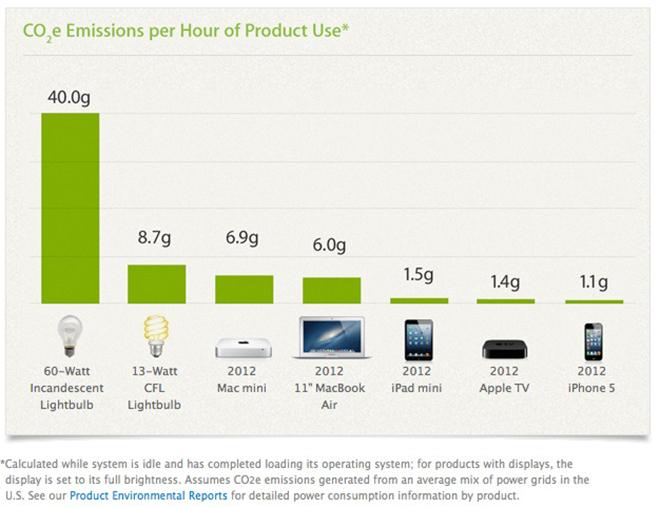Apple's data centers are 100 percent powered by renewable energy, and its corporate facilities are increasingly green, but a new report from the company shows that its greenhouse gas emissions actually increased by 34 percent in 2012.
The Apple and the Environment report aims to explore Apple's environmental impact from the production and transport of its products through their use by consumers, as well as the environmental costs associated with the support features Apple provides. The data centers that provide online services to Apple customers, the company says, are now completely powered by renewable energy. Facilities in Austin, Elk Grove, Cork, and Munich, as well as the Infinite Loop campus in Cupertino, now rely on a combination of wind, hydroelectric, geothermal, and solar energy to function.
Apple also says that renewable energy use at its corporate facilities has increased by 114 percent, so that now 75 percent of its facilities are powered by solar, wind, hydroelectric, and geothermal sources.
Data centers and facilities account for only two percent of Apple's total carbon footprint.
By the report's own admission, though, its data centers and facilities account for only two percent of Apple's total carbon footprint. The remaining 98 percent stems from the manufacture, transport, use, and recycling of its products. A full 61 percent of Apple's carbon footprint — 18,934,000 metric tons of greenhouse gas emissions — comes from the manufacture of its products. For bestselling products like the iPhone 5, the manufacturing process is the source of 76 percent of the 75kg of greenhouse gas emissions associated with the life cycle of one unit. For the newest iPads, that figure is 68 percent.
In total, Apple estimates that its operations produced 30.9 million metric tons of greenhouse gas emissions in 2012, up 34 percent over the company's 2011 estimates. The increase in emissions, the report notes, is due to the expanding sales of Apple devices. Apple has, since 2008, decreased the amount of greenhouse gasses it emits per dollar of revenue by 21.5 percent.
The company has been successful in reducing carbon emissions associated with many of its products. Emissions for the 2012 Apple TV are 90 percent lower than they were for the 2007 model, while the 2012 Mac mini causes only half the emissions of its 2007 forebear. The 15-inch MacBook Pro produces six percent fewer emissions over its lifetime than did the 2006 model.
A full 61 percent of Apple's carbon footprint comes from the manufacture of its products.
The other sizable contributor to Apple's environmental impact is the lifetime use of its products, accounting for 30 percent of the company's carbon footprint. Apple points to the company's focus on energy efficiency as evidence of its commitment to "green products." Today's Mac mini, the report says, uses as little as one-fifth of the power consumed by an incandescent 60W lightbulb. Apple says that its 2012 Mac mini, 11-inch MacBook Air, iPad mini, Apple TV, and iPhone 5 all, on a per-hour basis, produce fewer emissions than a 13W CFL lightbulb.
Eighteen percent of the lifetime greenhouse gas emissions for an iPhone 5 come from customer use. For the fourth-generation iPad and the iPad mini, those figures are 23 and 22 percent, respectively.
About two percent of Apple's carbon impact stems from efforts at recycling its products. The section of the report dealing with recycling is short on details, saying instead that the company is committed to developing long-lasting products.
Apple also says it established and met a goal to achieve a worldwide recycling rate of 70 percent. This rate is calculated by assuming a seven-year product lifetime for Apple wares and comparing the weight of the materials Apple recycles each year to the weight of the materials it sold seven years earlier. Apple is confident it will maintain a 70 percent recycling rate through 2015, the seven-year anniversary of the introduction of the iPhone.

Apple's use of glue and proprietary screws, some say, makes its products harder to recycle and thus less environmentally friendly.
Recycling in particular has been a point of contention between Apple and assorted environmental groups. Most recently, the company came under fire when it decided to withdraw its products from the government-backed "green electronics" EPEAT certification. Following a wave of public criticism, Apple acknowledged a "mistake" and refiled for eligibility for a number of its products.
Subsequent granting of EPEAT Gold status for some Apple products drew the ire of environmentally-minded observers, who claimed that Apple's use of glued-in components and proprietary screws made some Apple products essentially unrecyclable, and thus environmentally unfriendly devices.
AppleInsider spoke Wednesday with Gary Cook, Senior IT Analyst for Greenpeace, who praised Apple's increasing transparency in its environmental reporting. Apple's commitment to clean energy, Cook said, is encouraging, but the company's commitment to transparency is even more so.
"It's good for consumers to know that they can use these tools like iCloud and know that they're not increasing their carbon footprint."
—Greenpeace's Gary Cook
"We're pleased to see evidence that Apple is following through on its commitment to make its centers 100 percent renewable," Cook said. "It's good for consumers to know that they can use these tools like iCloud and know that they're not increasing their carbon footprint."
Greenpeace has clashed with Apple in the past, specifically over the company's plans to power its data centers. Apple's commitment to transparency, Cook says, can help set a standard for other companies to follow.
"Increased transparency shows an example that others can follow to provide details so that customers can see the impact of what they're buying," Cook continued. "We can use that information to challenge other companies."
 Kevin Bostic
Kevin Bostic








-m.jpg)






 Charles Martin
Charles Martin
 Malcolm Owen
Malcolm Owen
 William Gallagher
William Gallagher

 Christine McKee
Christine McKee
 Wesley Hilliard
Wesley Hilliard

 Andrew Orr
Andrew Orr








27 Comments
[quote name="AppleInsider" url="/t/156587/apple-claims-data-centers-100-renewable-powered-75-for-corporate-facilities#post_2298040"]Emissions for the 2012 Apple TV are 90 percent lower than they were for the 2007 model...[/quote] It looks like the 2013 Apple TV cuts the idle power in half. I don't know if that has a direct 1:1 ratio on the CO2e but it could bring it lower than the iPhone 5. [LIST] [*] http://www.anandtech.com/show/6834/apple-tv-2013-a1469-short-review-analysis-of-a-new-a5 [/LIST]
Greenpeace complains that employees are still driving gasoline powered cars and creating methane after eating in the cafeterias.
The emissions increase comes from all the hot air generated by industry analysts, media pundits and other members of the Hirudinea subclass.
[quote name="danvdr" url="/t/156587/apple-data-centers-now-100-percent-renewable-powered-but-emissions-rise-34-percent#post_2298053"]Greenpeace complains that employees are still driving gasoline powered cars and creating methane after eating in the cafeterias.[/quote] They are hypocrites. If you tell them the best way to lower their carbon footprint is to kill themselves they won't do it. They could at least castrate/neuter themselves so they won't add to the problem with later generations.
A human emits between .5 and 1kg of CO2 per day just breathing. More if you exercise.